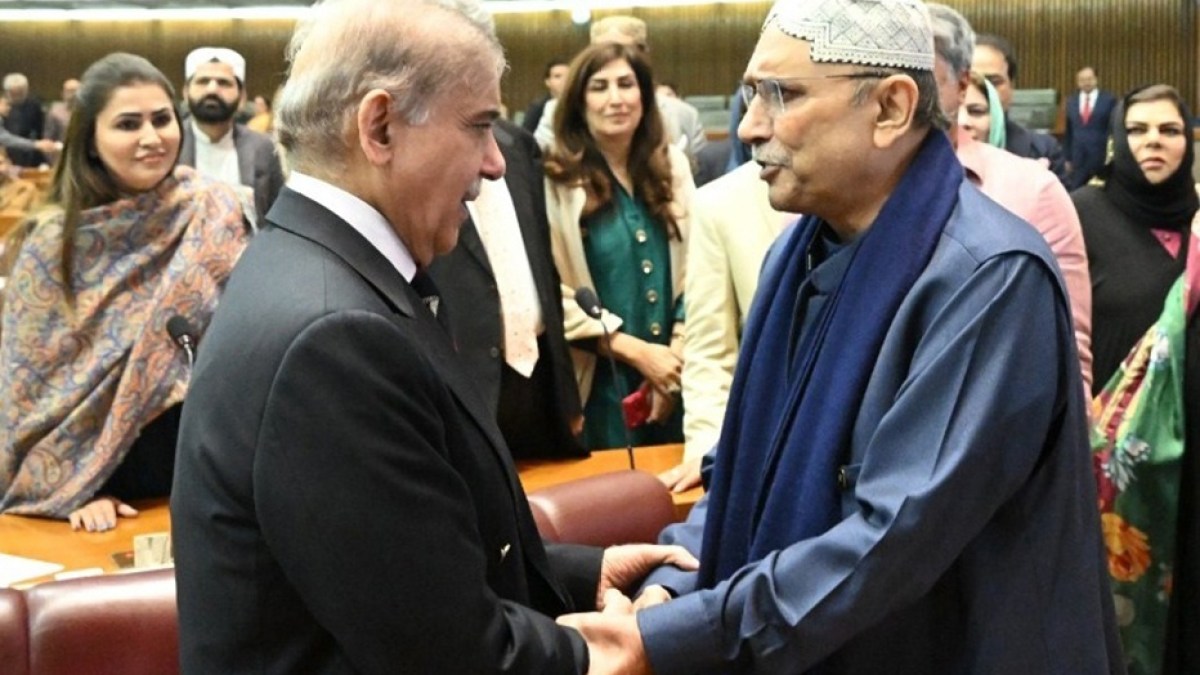Asif Ali Zardari (right) shakes hands with Shehbaz Sharif after the latter was sworn in as Prime Minister of Pakistan (European)
Asif Ali Zardari, the widower of the late Pakistani Prime Minister Benazir Bhutto, was elected today, Saturday, as President of Pakistan for the second time, having previously held this honorary position from 2008 to 2013.
The Pakistani Election Commission announced that Zardari, co-chairman of the Pakistan People's Party, received the support of 411 votes, compared to 181 votes won by the opposition candidate Mahmoud Khan Achakzai - the representative for the city of Quetta, the capital of Balochistan province - during the vote of the electorate, which includes members of the two chambers of Parliament and the four regional councils (Sindh, Punjab, and Balochistan). And Khyber Pakhtunkhwa.
A statement issued by the Election Monitoring Body on behalf of Chief Election Commissioner Sikandar Sultan said that the presidential poll was conducted in the capitals of the four provinces (Karachi, Lahore, Quetta and Peshawar) and the federal capital, Islamabad, adding that the results prepared by the chiefs from all five locations were received at the Commission’s secretariat.
Pakistan Peoples Party representatives voted for Zardari to this ceremonial position largely with the support of the Muslim League-Nawaz Sharif party in an alliance formed after the elections that took place on February 8.
Under the terms of the coalition agreement, which also includes a number of smaller parties, Shehbaz Sharif, leader of the Pakistan Muslim League-Nawaz party, was sworn in as prime minister last Monday.
Zardari is expected to take the constitutional oath in a ceremony held tomorrow, Sunday.
The role of president is largely ceremonial in Pakistan, and Zardari will also be commander-in-chief of the country's armed forces, which play a large role in making or toppling governments.
Zardari (68 years old) had previously been elevated to the presidency in 2008 after a sympathetic vote following the assassination of Benazir Bhutto during her re-election campaign. US special forces killed Al-Qaeda leader Osama bin Laden in an area of Pakistan in 2011 during Zardari’s presidency.
It is known that Zardari was previously subjected to repeated accusations of corruption and graft, and spent 11 years in prison from the early 1990s to 2004, which is a long period even by the standards of Pakistani politicians.
Observers of the political situation in Pakistan describe Zardari as "the patriarch of the Pakistan People's Party," and they expect his party to lead a coalition they consider "fragile" with the Nawaz League after the fraught results of last month's elections.
Pakistan's recent elections were marred by allegations of pre-poll fraud and vote tampering, with former Prime Minister Imran Khan imprisoned and banned from running, and members of his Tehreek-e-Insaf party targeted for arrests and censorship, and forced to run as independents.
The party defied expectations by winning more seats than any other party last month, but did not obtain the majority necessary to govern, paving the way for an alliance between the PML-N and the Pakistan People's Party. The Tehreek-e-Insaf party also supported Achakzai's candidacy for president.
Source: Agencies

